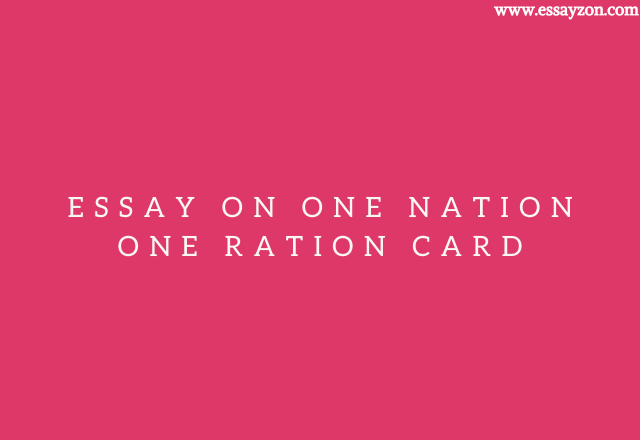Introduction
One nation, one ration card is a government’s ambitious initiative to make ration cards portable for people so that they can access it at any location in India. Under this program the food ministry assists migrant workers to get easy availability of food grains at subsidized costs. Let us see more about this public welfare scheme in detail.

Features of One Nation One Ration Card
Some of the important features of this program are:
Universal access to food
The scheme pursues to ease “portability of subsidized food grains” for internal migrant workers. To reap the benefits out of this scheme it is necessary that their ration card should be digitalized and associated with Aadhar. The program is held under the Integrated Management of Public Distribution System, an e- database of ration cards that is in practice in some states such as Gujarat, Andhra Pradesh, Jharkhand, Haryana, Kerala, and Karnataka.
Under this program, universal access is provided to PDS food grains. This service is also accessible to people in these states. ‘One Nation, One Ration Card’ is going to bring noticeable modifications for vulnerable migrants who work in India. The PDS, and food rationing system started during the famine of 1940.
Public distribution system
This card “One Nation One Ration” will provide benefits of public distribution system from ration shops using a single digital card associated to the Aadhaar card of the beneficiary. According to the public, and food distribution department, under this scheme, more than thousand migrant workers from AP have bought subsidized ration in Telangana per month.
Till date, nearly 82% of the 5.30 lakh shops have ePoS devices. Transactions on such devices do not requires any manual record keeping. The device checks for replication of ration card holders. Where AP, Gujarat, Jammu & Kashmir, Maharashtra, and Haryana have automated their fair price ration stores, a few of them in Uttarakhand, and Bihar are still remaining.
Solves Ration insecurity
At the fair price ration shops, over 5.35 lakh throughout India, and 23 crore ration card holders have the ability to purchase up to five kg of rice at just Rs 3/kg, coarse grains at just Rs 1/kg, and wheat at just Rs 2/kg as instructed under the NFSA “National Food Security Act”, 2013.
The state, and central governments will organize this intricate public distribution system. By proper identification of eligible households, issuance of licenses, and ration cards to dealers, the program ensures that right beneficiary get the subsidized food grain and no one starves.
Portable solution
One Nation One Ration Card plan proposed by Public food distribution ministry makes ration card portable with ePoS machines, and biometric verification. This feature allows any migrant ration card holder to purchase subsidized food grain from any fair price retail shop in India.
Due to the portability feature of the plan, the existing ration card of the beneficiary will remain valid as long as the entitlements, and card data are upheld in the home state of the person. Through the centralized repository, the beneficiary state can fetch the details from their server post biometric authentication.
How to get the benefits from this scheme?
- As the ration cards are associated to the regions where migrants used to live, they will need to apply for a new ration card at the” new location” if they wish to purchase food grains at subsidized rates. Many don’t get deterred by this long process, that dents the effort of government to ensure food security to all.
- Other than this requirement, to avail public distribution system benefits under this scheme from any ration shops, the ration card of that migrant worker needs to be linked to his Aadhaar card.
- It is also important that all fair price ration shops should have the necessary ePoS devices to ensure seamless biometric authentication.
Challenges of One Nation, and One Ration Card
There are a few challenges for the proper execution of this plan.
- One of them is that ensuring that 14 crore migrants (as per the 2011 Census), to obtain food grain from ration shops at a new location is a major challenge.
- Another challenge is to get the present location of any migrant worker to prevent duplication. Proper management of location specific records of an immigrant worker is necessary so that there should be no duplication of ration cards. Duplication will prevent beneficiary to get access to food grain as someone else have already taken away their quota by presenting a fake card. To overcome this challenge, the government is planning to set up a centralized repository of all ration cards so that only the ones whose names exists in the database after de-duplication will be entitled to use the benefits under the scheme.